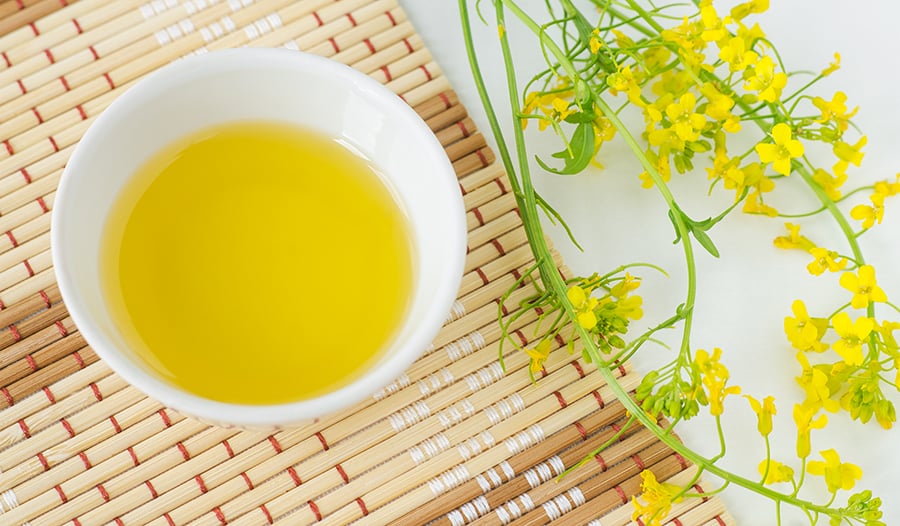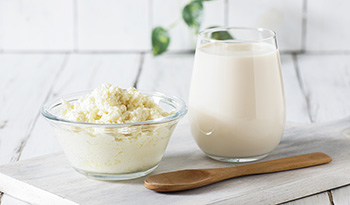Applying Castor Oil To Your Belly Button: Does It Work?

Key Takeaways
- Applying castor oil to the belly button is a popular wellness trend rooted in Ayurvedic practices.
- There is no scientific evidence that the belly button offers unique absorption benefits for castor oil.
- Castor oil does have proven benefits for skin hydration and, when used topically in packs, may help with constipation and cramping.
- The benefits come from the oil being absorbed through the skin in general, not specifically the navel.
What Is Castor Oil?
Castor oil is a vegetable oil produced by pressing the seeds of the Ricinus communis plant.
While raw castor beans are toxic, containing a poison called ricin, the oil manufacturing process removes this toxin completely. The final, commercially produced castor oil is safe for use and has been valued for centuries for its powerful medicinal and therapeutic properties.
Used for centuries in traditional medicine by cultures like the ancient Egyptians and Greeks, castor oil has long been valued for its therapeutic properties.
While it remains a staple in the modern beauty industry, a new wellness trend is now sparking interest: applying castor oil to the belly button for its potential health benefits.
What Are The Claims About Castor Oil In The Belly Button?
With the increasing use of social media and increased health awareness, there has been a heightened curiosity about navel-pulling.
Navel pulling is a popular oil pulling variation that involves swishing oils like coconut oil in the mouth before spitting them out for oral benefits. It involves putting a few drops of castor oil in the belly button, massaging it in, and then removing the excess.
This practice claims to bring about a variety of benefits such as:
- Improved Digestion
- Reduced Bloating
- Hormone Balance
- Stress Relief
- Better Sleep
- Menstrual Cramp Relief
- Decreasing Pain
- Aiding Weight Loss
However, at this time, no research confirms that castor oil in the belly button provides health benefits that extend beyond or differentiate from placing castor oil over a broader range of skin, like the whole abdomen.
While the belly button trend may lack research to support its claims, studies indicate that castor oil has amazing health benefits.
The Proven Benefits Of Topical Castor Oil
Deep Skin Hydration and Moisturization
While castor oil is most often known for its potential to relieve constipation, studies suggest that it may also improve skin quality.
Many people struggle with dark under-eye circles that may worsen with age. One single-arm clinical trial looked into the effects of a cream containing castor oil to reduce the appearance of under-eye circles.
The study involved 25 patients who applied a castor oil cream twice a day for 2 months to the area under their eyes. The data from 22 of the 25 patients enrolled in the study suggested that castor oil cream reduced the amount of melanin under the eyes, improved wrinkles, and tightened the skin.
While this research is promising, more randomized placebo-controlled trials are needed to determine if castor oil improves skin discoloration. Furthermore, it remains to be seen if castor oil could reduce skin discoloration in other parts of the body, not just under the eyes.
Alleviating Constipation and Cramping
Castor oil has long been used to decrease constipation. While many cultures take castor oil orally for a variety of health concerns, one of the most recognized ways to use castor oil for constipation is a castor oil pack.
One clinical trial involved elderly study participants from two rest homes. The majority of participants (80%) reported that they had suffered from constipation for at least 10 years.
Study participants used castor oil packs as an intervention to decrease the symptoms of constipation. The study found that administering castor oil packs didn't significantly change the number of bowel movements or the amount of stool passed, but it did decrease the amount of straining to pass stool.
The study also found that castor oil packs increased the feeling of complete evacuation after the participants had a bowel movement.
Castor oil is even being studied as a potential intervention to help evacuate the bowel in preparation for colonoscopy procedures.
How Castor Oil Works
Research indicates that castor oil is a powerful laxative. This is due to its active constituent, ricinoleic acid. Ricinoleic acid is produced in the intestines when intestinal lipase, an enzyme that breaks down fats, metabolizes castor oil.
The introduction of ricinoleic acid into the intestines causes a surge of calcium, which then acts as a stimulating laxative by causing smooth muscle contractions. Castor oil's intestinal-stimulating properties place it in the same category as other stimulant laxatives like Senna.
Regarding skincare, castor oil may help improve dark spots and hyperpigmentation by inhibiting tyrosinase. Tyrosinase is the enzyme that converts tyrosine to melanin. This is similar to other compounds that can act as natural skin brighteners, like vitamin C. Melanin is a naturally occurring compound that gives the skin, hair, and eyes their color.
How To Make A Castor Oil Pack
Castor oil packs are one of the most effective ways to apply castor oil topically, as they cover a much larger area than just the belly button. For issues like constipation, applying a pack to the entire abdomen may provide more noticeable benefits.
What you'll need:
- A piece of wool flannel or organic cotton cloth (about 12x12 inches or 30x30 cm)
- Castor oil
- A bowl to catch excess oil
- A piece of plastic wrap or a plastic bag large enough to cover the cloth
- A heating pad or hot water bottle (optional)
Instructions:
- Soak the Cloth: Place the cloth in a bowl and pour castor oil over it until it is completely saturated. This part can be messy, so the bowl will help contain drips.
- Apply to Skin: Place the oil-soaked cloth directly onto the area of the body you wish to treat, such as your abdomen.
- Cover with Plastic: Lay the piece of plastic wrap or a plastic bag over the cloth. This prevents oil from staining your clothes or furniture.
- Apply Gentle Heat (Optional): To help the oil absorb into your skin, you can place a heating pad or hot water bottle over the plastic-covered pack.
- Rest and Relax: Leave the pack in place for at least one hour. For consistent benefits, some traditional practices suggest using a pack for three consecutive days.
Potential Side Effects Of Castor Oil
While castor oil may have some amazing health benefits, it can also cause adverse effects, especially in those who are sensitive to it. The potential for side effects can also increase if it is overused. Studies suggest that castor oil may cause cramping, dizziness, bloating, and vomiting. These side effects are more common when castor oil is taken orally rather than applied topically.
With topical administration, there is a chance of an allergic response, such as itching, redness, or allergic contact dermatitis. Before using castor oil for the first time, it is usually recommended that you apply a small amount of oil to the skin and monitor for any adverse reactions.
Since studies suggest that castor oil works to promote smooth muscle contractions, it is not recommended during pregnancy. Castor oil is also not recommended for those who suffer from bowel obstruction, inflammatory bowel disease, or appendicitis.
Takwaway
While those who engage in navel pulling, or the castor oil belly button trend, may report fantastic health benefits, there is no research to support these claims at this time. That doesn't mean that castor oil may not possess significant health benefits in and of itself. Studies suggest that castor oil may act as a powerful laxative with the potential to better prepare patients for the colonoscopy procedure. Castor oil may also help brighten and improve skin tone and texture. Whether for gastrointestinal health or beauty enhancement, castor oil may be a game-changer for those looking to optimize their health and wellness.
References:
- Castor oil plant. Encyclopædia Britannica. Available from: https://www.britannica.com/plant/castor-oil-plant
- Ricin: chemical fact sheet. Centers for Disease Control and Prevention. Available from: https://www.cdc.gov/chemical-emergencies/chemical-fact-sheets/ricin.html
- Thornton SL, Darracq M, Lo J, Cantrell FL. Castor bean seed ingestions: a state-wide poison control system's experience. Clin Toxicol (Phila). 2014;52(4):265-268. doi:10.3109/15563650.2014.892124
- Patel VR, Dumancas GG, Kasi Viswanath LC, Maples R, Subong BJ. Castor Oil: Properties, Uses, and Optimization of Processing Parameters in Commercial Production. Lipid Insights. 2016;9:1-12. Published 2016 Sep 7. doi:10.4137/LPI.S40233
- Polito L, Bortolotti M, Battelli MG, Calafato G, Bolognesi A. Ricin: An Ancient Story for a Timeless Plant Toxin. Toxins (Basel). 2019;11(6):324. Published 2019 Jun 6. doi:10.3390/toxins11060324
- Arslan GG, Eşer I. An examination of the effect of castor oil packs on constipation in the elderly. Complement Ther Clin Pract. 2011;17(1):58-62. doi:10.1016/j.ctcp.2010.04.004
- Takashima K, Komeda Y, Sakurai T, et al. Castor oil as booster for colon capsule endoscopy preparation reduction: A prospective pilot study and patient questionnaire. World J Gastrointest Pharmacol Ther. 2021;12(4):79-89. doi:10.4292/wjgpt.v12.i4.79
- Parvizi MM, Saki N, Samimi S, Radanfer R, Shahrizi MM, Zarshenas MM. Efficacy of castor oil cream in treating infraorbital hyperpigmentation: An exploratory single-arm clinical trial. J Cosmet Dermatol. 2024;23(3):911-917. doi:10.1111/jocd.16056
- Alookaran J, Tripp J. Castor Oil. [Updated 2024 May 24]. In: StatPearls [Internet]. Treasure Island (FL): StatPearls Publishing; 2025 Jan-. Available from: https://www.ncbi.nlm.nih.gov/books/NBK551626/
DISCLAIMER:This Wellness Hub does not intend to provide diagnosis...
















































































 Table of Contents
Table of Contents















